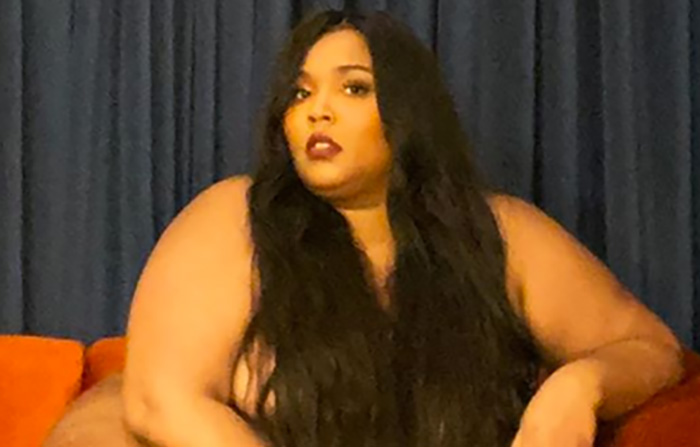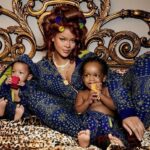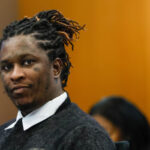Target supports Black History Month with their Dare. Dream. Do Campaign. Check they’re stories below and Steve Stoute’s Target Commercial.
Malaak Compton-Rock – Global Citizen
My name is Malaak Compton-Rock, I am founder and director of the Angel Rock Project. I work with orphan and vulnerable children, and granny-led households in South Africa, and the children are orphaned and the grandparents are taking care of their grandkids due to HIV aids. I mean, just, a whole generation of folks my age, are just gone. Y’know I went to South Africa for the first time on vacation. To go to Johannesburg, to go to Cape Town, to go on safari, and at the last minute I called up my old boss, at UNICEF, and I said “Can you set up a UNICEF visit for me? I’d like to see the projects in Johannesburg.” And he did, and I went to this area, Deepslit, and I met with orphan and vulnerable children in granny led households. When I was leaving, one of the grannies said to me “What are you going to do?” and I said “what do you mean, what am I going to do?” She said, “People come and stare at us all the time. People come all the time, they look at us, we parade around, they leave and they do nothing. What are you gonna do?” and I said, “Well, what do you want me to do?” She said, “we need to make money. We’re raising our grand-kids, we want to send them to school, we need them to have enough food, we want them to have a better life.” Someone once said to me, “When you wanna affect change, ask questions and listen to what they need, don’t go in there with your pre-conceived notions about, how you feel their life should be,” and I think that’s the greatest advice that I’ve ever been given, to be in the non profit world. So when I came back, the first thing I did was attend a granny-led support group, where the grandmothers were just talking about the things that they needed, the things they wanted to achieve for themselves and for their lives. And so, you know, in listening to that then I can say, OK, I think I can help here, I think I can help there. I mean, I think you need to know your limitations, you know, and what you do well. And so I, I know what I do well and I offered my services, my skills, my resources and, um, you know, we’ve been at it for three years now.
Steve Stoute – Hard Work
I’m Steve Stoute, uh, I’m an entrepreneur. Early in my career as a, I was a record industry executive, I went from a road manager to an industry executive at Universal and Sony Music, and uh, my roles varied throughout those companies but I ended up becoming the president of both of the companies at the, the end, of the when I decided to walk away from the record business and go into the advertising business. In the advertising business I own an agency called, “Translation,” um, which does marketing and communication services for Fortune 500 companies. I left a big job, put it all on the line to go become a partner at an advertising agency in an industry that was, I was very new to, but um, at thirty. But it felt right; it felt like I could, if I bet on myself, I could, um, accelerate the growth, or my growth within that industry itself. If your gut instinct tells you that it’s right, I don’t associate that with risk. I think it’s risk when you don’t follow your gut instinct; that’s risky. Cause there’s something about that, there’s something about you, innately that says, “this makes sense, and for you not to follow that, you’re actually betting against yourself, and that’s risky. As long as I’m honest with my beliefs, and I’m honest with what makes me wake up in the morning and go, “yeah I want to do this,” as long as I’m honest with that, and I don’t allow, um, the fear of risk, or the fear of fear itself to interfere with that, then, I’ll be happy. ‘Cause that, that would be pursuing my dreams. I never wanted to, do something, just because. I always wanted to do something that I was passionate about and I believe in. And, uh, that, that sorta encapsulates what my dreams are.
Marcus Samuelson – Opportunity
I’m a chef, I’ve been cooking all my life. And you know, seeing the world from the back of the house, my view, from the kitchen point of view. Not being able to taste, not being able to serve food for a lot of people. And, uh, that was one of my dreams and goals when I started cooking, to be able to travel the world, uh, through food. I was born in Ethiopia, about an hour outside Addis, the capital. And, when I was three, we had tuberculosa, and then I was adopted to a Swedish family, grew up in Sweden, and had an incredible upbringing and childhood in Sweden. I grew up cooking Swedish food, and then I traveled to France. My goal was to go to France, me and my mom, we went to the public library, we wrote to every three star Michelin restaurant in France. We got thirty-eight “No” every year, until one year, I got one yes. That was opportunity. I think it’s in great reflection of life, I mean it’s a whole ocean of No’s, and then till you get that one Yes, and you just bang out the door and make the most of that opportunity. When I was about twenty-three, I wanted to move to America. I moved to New York City, and America and New York have sort of answered all my questions, all my hopes, all my wishes, and it’s really based on diversity. My food, is a reflection on my journey, it will always have Africa in it, I will always carry the Swede in me, and I will, above everything, I will always be the New York and American that I am, this is the place that allows me to be both of those things.
Marc Morial – Helping Others
I’m Marc Morial, president of the National Urban League. We researched the social and economic conditions that face the nation, the social and economic conditions that face black Americans, and the urban community at large. Uh, and we serve people through after school programs, early childhood programs, job training initiatives, job placement programs. Uh, we help people become homeowners through home ownership classes home ownership counseling. We do a lot of community health education, so one of the big things we do, is we serve people directly. And we serve people without fee, without charge, and most of the people we serve are economically disadvantaged, they’re some of the nation’s neediest citizens. I think I grew up with it, uh, in my DNA that, service, no matter what you’re economic station in life was, no matter what your academic achievements were, no matter what, quote-un-quote job or profession you were in, was part of dues you owed to a community. I try to instill that in young people that I have an opportunity to talk to. The idea that you are, where you are, you are able to take advantage of opportunity because of others. Young people need as much support, they need all the support that schools can give them, all of the support that parents and family can give them, all of the support that communities can give them, if we want them to be the next generation of leaders in this country.

![Da Brat Marries Judy Dupart on 2.22.22 [PHOTOS]](https://hiphopucit.com/wp-content/uploads/2022/02/1645669184565-440x264.jpeg)
![Drake Reveals Photos of His Son Adonis [Photos]](https://hiphopucit.com/wp-content/uploads/2020/03/Drake-and-on-Adonis-HHUCIT.jpg)

![Megan Thee Stallion – “BOA” [NEW VIDEO]](https://hiphopucit.com/wp-content/uploads/2024/05/Megan_Thee_Stallion___BOA__Official_Video__1_12_screenshot-440x264.jpg)
![Doechii Feat. JT – “Alter Ego” [NEW VIDEO]](https://hiphopucit.com/wp-content/uploads/2024/05/Screenshot-of-Doechii-and-JTs-Al-440x264.png)
![Young Thug Feat. Drake Drop – “Oh U Went” [NEW VIDEO]](https://hiphopucit.com/wp-content/uploads/2023/07/Young-Thug-and-Drake-1014x570-1-440x264.png)











